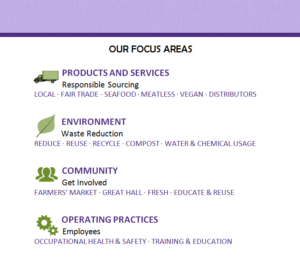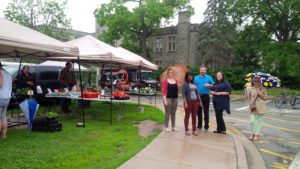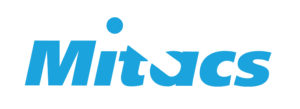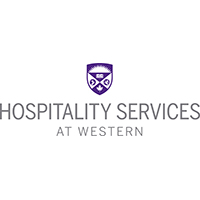Toolkit | Project
Post-Secondary Institution – Hospitality Services
Western Hospitality Services: Toolkit Ambassador used Toolkit to Tell Their Story
By: Jillian Tweedy, Sustainability & Local Food System Analyst – Hospitality Services at Western
August, 2015
Servicing over 20,000 students and staff a day and employing a workforce of over 600, Hospitality Services, a division of Housing and Ancillary Services, has a notable impact on the overall sustainability of Western University. Currently, Western is working on the sustainability goals outlined in the 2012 President’s Advisory Committee on the Environment and Sustainability (PACES) Action Plan – Creating a Sustainable Western Experience. Three of the PACES goals directly relate to the operations of Hospitality Services. These include:
- Sustainability as a major student learning initiative within Western’s residences. As Hospitality Services is responsible for Residence Dining, they play a large role in educating students and promoting sustainability within the Western’s residences. Hospitality Services was pleased to receive the National Association of College & University Food Service (NACUFS) sustainability award in waste management for their “Choose to Reuse” take-out container initiative in residences and is continually looking for new ways to integrate sustainability into their operations.
- Access to healthy, local, organic, and fair trade food with vegan and vegetarian options widely available. Hospitality Services currently uses over 40% local food in Residence Dining and is opening a soup and salad bar in the University Community Center in 2015 to increase the number of healthy food options available to staff and students. This fall, Hospitality Services will accomplish another goal when Western University is designated as a Fair Trade Campus.
- Becoming a zero-waste campus. Hospitality Services diverts over 200 tonnes of organic waste from landfill each year. In addition to the reusable “Choose to Reuse” container, all take-out containers purchased on campus by Hospitality Services are either recyclable or compostable. Ways to decrease the amount of waste that is sent to landfill from their operations are continually explored.
Hospitality Services is comprised of six distinct divisions, encompassing the majority of food operations on campus. With such a wide breadth of operations within the Western community, Hospitality Services is continually working to become more sustainable. The Sustainability Toolkit provided the organization a way to further integrate sustainability into its day to day operations by documenting and tracking its current sustainability actions. The Toolkit also provided an approach that allowed Hospitality Services to tell their story and highlight their achievements. The use of the Toolkit focused on the creation of a Sustainability Report for Hospitality Services while providing a framework to follow for continuous improvement.

Figure 1. The four Sustainability Criteria from the Sustainability Toolkit as used in the Hospitality Services Sustainability Report 2015
The Sustainability Toolkit was used to consolidate Hospitality Services’ existing sustainability initiatives into a living document that can be updated as new initiatives are started and goals are reached. The four overarching Sustainability Criteria from the Toolkit (Products & Services, Environment, Community, and Operating Practices) were used as the sections for Hospitality Services’ sustainability report (Figure 1).
Many of Hospitality Services current initiatives, such as responsible sourcing, waste reduction, the weekly Farmers’ Market, and food safety all fall under these criteria.

The Toolkit was also used to review and assess Hospitality Services’ existing Sustainability Action Plan. The two major gaps that were identified were reporting and recognition. Hospitality Services has received accolades in the past (e.g. Western Green Award for the Farmers’ Market and contributing to STARS Gold for Western) and has a Sustainability page on their website, however, recognizing and reporting their achievements needs to be something that they continue to do on a regular basis. With the need to report built into the 13-step Plan-Do-Check-Act cycle (Steps 10 and 12), Hospitality Services saw 2015 as a good year to publish their first Sustainability Report. The creation of this report not only allows the Western community a chance to see what initiatives Hospitality Services has completed and are working towards, but also allows for the different divisions to be more aware of the initiatives happening throughout the various operations. The report should be available to view by the end of 2015 on the Hospitality Services Website.
As Hospitality Services moves forward with their sustainability initiatives, the framework provided by the Toolkit will be used in their product sourcing and assessing their environmental impacts to ensure that the tasks are being completed effectively. With self-auditing (Step 9) being a component of the framework, it will allow Hospitality Services to improve monitoring of their initiatives and identify what is working and what could be changed. The Toolkit should provide a comprehensive plan which Hospitality Services can use whenever they are assessing a new sustainability initiative, from increasing responsibly sourced food to choosing the best way to engage their numerous stakeholders.
 The research for this case study was funded with the support of a Mitacs Accelerate grant. For more information on the research project, please view our blog and white paper.
The research for this case study was funded with the support of a Mitacs Accelerate grant. For more information on the research project, please view our blog and white paper.




